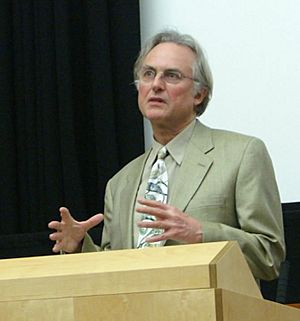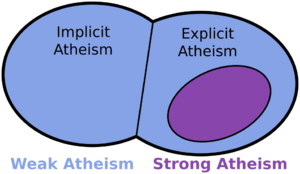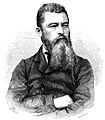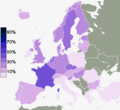Atheism facts for kids

Atheism is when someone does not believe in a god or gods. It's the opposite of theism, which is believing that at least one god exists. A person who doesn't believe in gods is called an atheist.
Atheism is different from agnosticism. Agnostics say we can't truly know if gods exist or not. An agnostic might still believe in a god (a theist agnostic), or they might not (an atheist agnostic).
Contents
Why People Are Atheists
Atheists often have reasons for not believing in a god or gods. Some common reasons include:
- The problem of evil: This idea questions how a good and powerful god could allow so much suffering in the world.
- The argument from inconsistent revelations: This points out that different religions have very different ideas about God. These ideas often contradict each other.
- The argument from nonbelief: This suggests that if a god wanted people to believe, there would be clearer signs or evidence.
Some atheists don't believe in any god because there is no clear proof for any god or gods and goddesses. They think believing in any type of theism means accepting ideas without proof. These atheists often prefer a simpler explanation for everything, called methodological naturalism. This means they believe only natural things exist. The idea of Occam's razor supports this, suggesting that simpler explanations with fewer unproven guesses are often more likely to be true.
What the Word "Atheism" Means
The word "atheism" comes from the Greek language. It combines a- (ἄ), which is a Greek prefix meaning "without," and theos (θεός), meaning "god." So, it means "without gods" or "godless." In Ancient Greece, it also meant "impious," which means not showing respect for gods.
Around 500 BC, the word started to describe people who were "denying the gods." Before that, it mostly meant "impious." There was also a Greek word, ἀθεότης (atheotēs), which meant "atheism."
The Roman writer Cicero used the Greek word in Latin as atheos. This word was often used by early Christians and followers of Greek mythology to insult each other.
For a long time, calling someone an "atheist" was an insult. People would not call themselves atheists. The term "atheism" was first used to describe a positive belief (disbelief in God) in Europe in the late 1700s. This was usually about not believing in the monotheistic God of Abrahamic religions.
In the 1900s, the word expanded to mean not believing in any gods at all. However, in Western countries, it's still common to define atheism simply as "disbelief in God."
Atheism Around the World
In many places, it was (or still is) against the law to openly say you are an atheist. For example, claiming the Bible or Qur'an was not true, or saying there is no god, could be a crime.
In some places with many conservative Muslim people, becoming an atheist (called Muslim apostasy) can be dangerous. Some religious courts have punished this act with the death penalty. Many countries still have laws against atheism.
Atheism is becoming more common. This is mainly in South America, North America, Oceania, and Europe. This is seen in the percentage of people who used to have a religion but now identify as atheist.
In many countries, especially in the Western world, laws protect atheists' right to express their beliefs. This is part of freedom of speech. It means atheists have the same legal rights as everyone else. Freedom of religion in international law also includes the freedom to not have a religion.
Today, about 2.3% of the world's population identifies as atheist. About 11.9% are described as nontheist. In Japan, between 64% and 65% of people say they are atheists, agnostics, or non-believers. In Russia, this number is up to 48%. In European Union countries, the percentage ranges from 6% (Italy) to 85% (Sweden).
Different Ways to Define Atheism
People sometimes disagree about what atheism truly means. They also disagree on who should be called an atheist.
Implicit and Explicit Atheism
Atheism is usually described as not believing in God.
George H. Smith created the terms "implicit atheism" and "explicit atheism." Implicit atheism is when someone doesn't believe in God because they don't even know about the idea of God. Explicit atheism is when someone doesn't believe in God after learning about the idea.
In 1772, Baron d'Holbach said that "All children are born atheists; they have no idea of God."
In 1979, George H. Smith said: "A person who doesn't know about theism is an atheist because they don't believe in a god. This also includes a child who can understand the idea but hasn't learned about it yet. The fact that this child doesn't believe in god makes them an atheist." These quotes describe implicit atheism.
Ernest Nagel disagrees with Smith's idea that atheism is just "not having theism." He thinks only explicit atheism is true atheism. This means Nagel believes that to be an atheist, a person needs to know about God and then reject that idea.
"Weak" and "Strong" Atheism
Philosophers like Antony Flew talk about strong (also called positive) atheism and weak (also called negative) atheism. In this view, anyone who doesn't believe in a god or gods is either a weak or a strong atheist.
Strong atheism is the firm belief that no god exists. Weak atheism includes all other ways of not believing in a god or gods. These terms have been used in philosophical and Catholic writings since at least 1813.
Under this definition, most agnostics are weak atheists. Michael Martin says that agnosticism is a type of weak atheism. Some agnostics, like Anthony Kenny, disagree. They think being agnostic is different from being an atheist. They believe atheism is like believing in a god because both require a belief. However, agnostics also have their own belief, which is about what can be known.
Agnostics say it's impossible to know if a god or gods exist. They think strong atheism requires a "leap of faith" (believing something without proof).
Atheists usually respond by saying there's no difference between a religious idea with no proof and other ideas without proof. The lack of proof that god does not exist doesn't mean there is no god, but it also doesn't mean there is a god.
Scottish philosopher J.J.C. Smart says that "sometimes a person who is really an atheist might call herself an agnostic. This happens because of a general philosophical skepticism that would stop us from saying we know anything at all, except maybe math and logic."
Some popular atheist writers, like Richard Dawkins, show the difference between theist, agnostic, and atheist views by how likely they think the statement "God exists" is.
Atheism in Everyday Life
In daily life, many people explain natural events without needing a god or gods. They don't necessarily deny that gods exist. They simply say that gods are not needed to explain things. According to this view, gods don't give life a purpose or influence it.
Many scientists use something called methodological naturalism. This means they quietly accept that only natural things exist and use the scientific method. Their personal belief in a god doesn't change their scientific work.
Practical atheism can show up in different ways:
- No religious motivation: Belief in gods doesn't make them act morally, religiously, or in any other way.
- Ignoring the problem: They actively keep the idea of gods and religion out of their thinking and actions.
- Indifference: They simply have no interest in questions about gods and religion.
- Unawareness: They don't know about the idea of a god.
Theoretical Atheism
Theoretical atheism tries to find arguments against the existence of god. It also tries to show why arguments for theism, like the argument from design or Pascal's Wager, might not be true. These theoretical reasons often come from philosophy (the study of being) or epistemology (the study of knowledge). Some also use ideas from psychology or sociology.
Ideas from Philosophers
Immanuel Kant
Immanuel Kant believed that you cannot prove the existence of a supreme being using only reason. In his book, "Critique of Pure Reason," he tried to show that all attempts to prove or disprove God's existence lead to confusing ideas. Kant said it's impossible to know if there are any higher beings. This makes him an agnostic.
Ludwig Feuerbach
Ludwig Feuerbach wrote The Essence of Christianity in 1841. In his book, he suggested these ideas:
- Religion is not just a historical fact. It is mostly something created by human minds or imagination.
- All religions are different in how they look, but they are alike in one way: They are ideas that come from humans' unmet needs. God and all religious ideas are just psychological projections. The reasons for these ideas come from human nature.
Feuerbach's ideas can be summed up with these phrases:
- Man created God in his image.
- Homo homini Deus est (which means 'Man is a god to Man').
Related pages
Images for kids
-
Paul Henri Thiry, Baron d'Holbach, an 18th-century supporter of atheism. He wrote: "The source of man's unhappiness is his ignorance of Nature."
-
Buddhism is sometimes called nontheistic because it doesn't have a creator god. However, this view can be too simple.
-
Ludwig Feuerbach's The Essence of Christianity (1841) greatly influenced philosophers like Engels and Marx. He believed God was a human invention and religious activities were wish-fulfillment. He is seen as a founder of modern anthropology of religion.
-
A 1929 magazine cover from the USSR League of Militant Atheists. It shows the gods of Abrahamic religions being crushed by the Soviet five-year plan.
See also
 In Spanish: Ateísmo para niños
In Spanish: Ateísmo para niños
 | Audre Lorde |
 | John Berry Meachum |
 | Ferdinand Lee Barnett |












